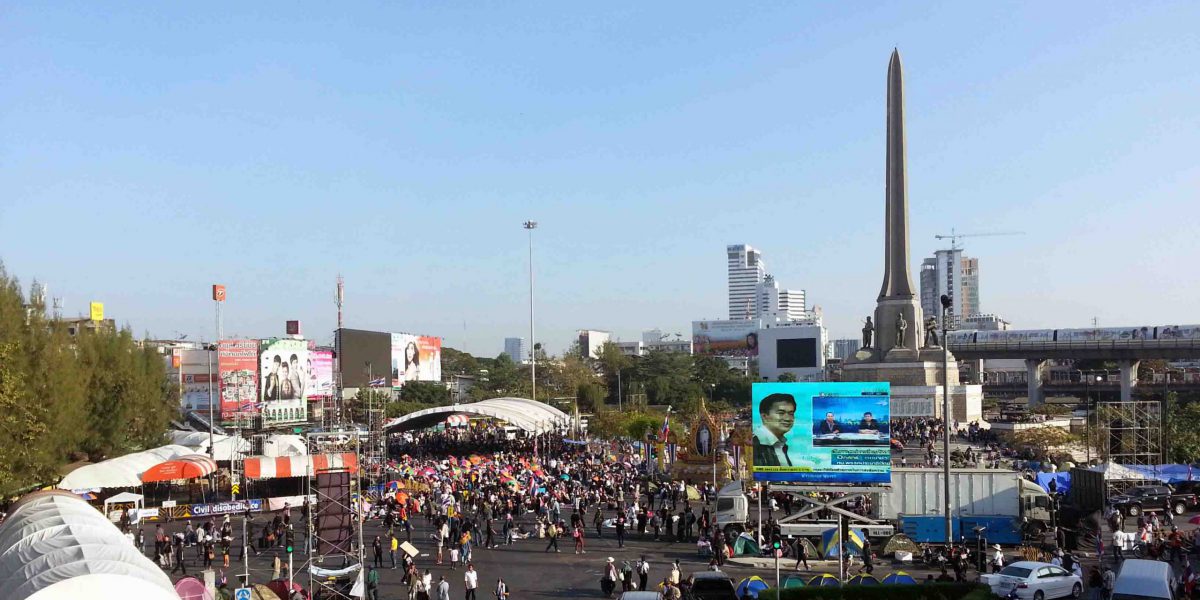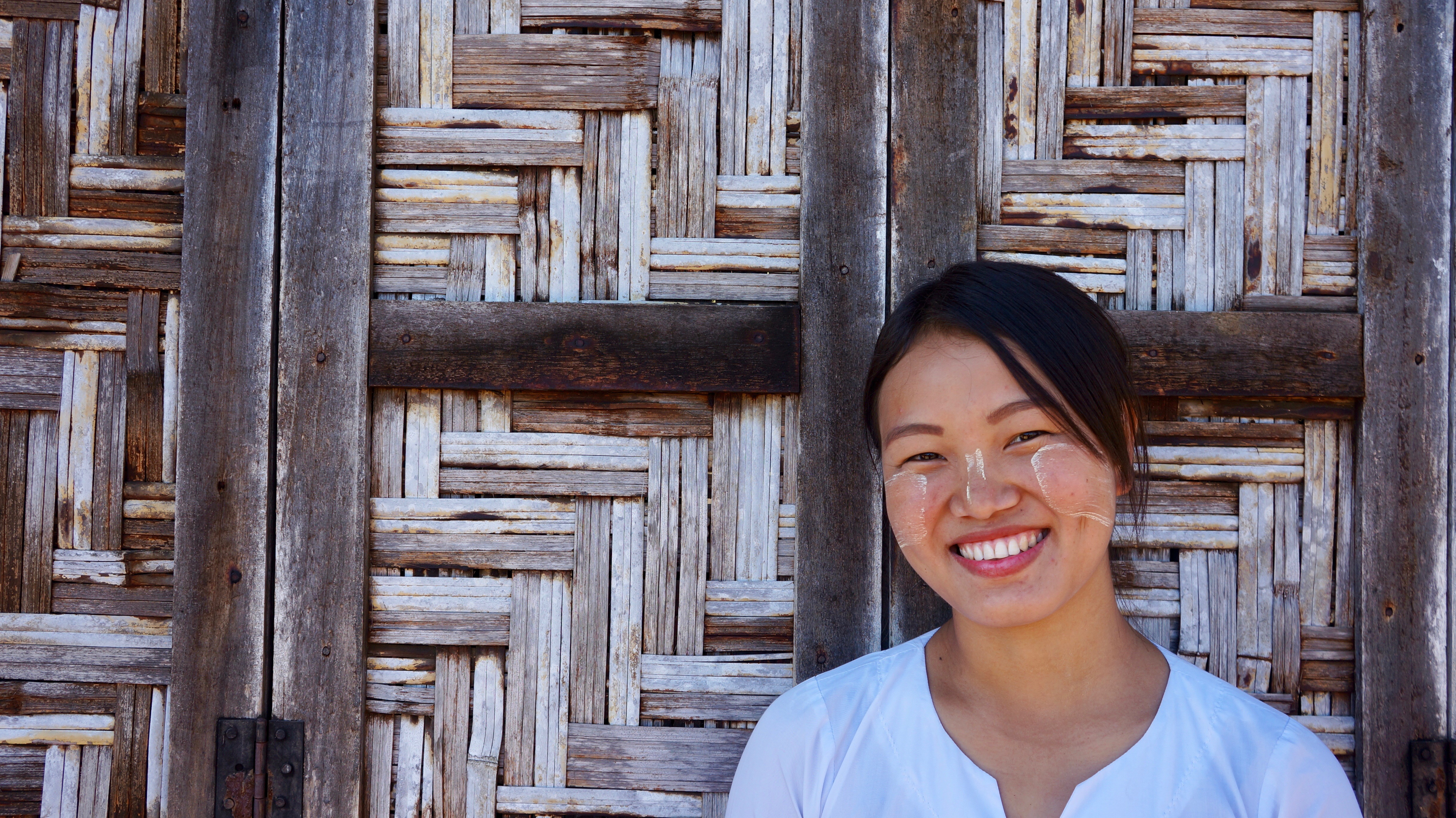Thailand: Unrest in Bangkok
18 February 2014|Sermsiri Ingavanija

Bangkok, 18 February 2014 – A rising sense of fear in urban refugee communities is an unintended consequence of the ongoing civil unrest in Bangkok. The JRS Thailand teams serving these vulnerable communities have witnessed the increased tension and done their best to provide encouragement to refugees in Bangkok, even while wondering themselves, whether or not they would make it into the office each day.
The JRS Thailand and JRS Regional Offices are located close to Victory Monument in Bangkok, which until recently, was the site of one of the major protest gatherings, led from a substantial makeshift stage which blocked traffic, turning the whole area into a pedestrian thoroughfare.
“Police and the protesters’ guards were checking every person who entered the area. Refugees were very afraid to enter the area [to access JRS services] as the majority of them are here without any official travel documents and so face arrest and detention if caught by police.” Related Saengduan Irving, Project Director, Urban Refugee Project, Bangkok.
During the recent Bangkok protests the likelihood of refugees, who live precariously in Bangkok at the best of times, being arrested increased – due to the enhanced police presence in the Victory Monument Area. The risk of injury to JRS staff and clients was also apparent after the protest stage at Victory Monument became the focus of at least one violent attack. To ensure the safety of our staff and our refugee clients, the offices were forced to close for some days.
For those refugees in the centrally located Bangkok Immigration Detention Centre (IDC) the tension was even higher as about 100 African and Vietnamese detainees were moved to a different centre outside the city, in case the protestors cut water and electricity to some areas and to make space, just in case the protests turned violent and the police were forced to make arrests and detain demonstrators.
“We were able to negotiate with the IDC authorities that ten detainees who were scheduled to be resettled or released and repatriated (in the case of non-refugees) during the week of the protests should be able to stay in Bangkok so that they could easily catch their flights, all of them managed to leave the country without further delays” said Wanrob Wararasdr Project Director, IDC Project, Bangkok.
Widespread protests in Bangkok, Thailand began at the end of October 2013, when the Royal Thai Government (government) House of Representatives passed the final reading of the amnesty bill. The blanket amnesty bill would have pardoned all politicians involved in the political protests which took place in Thailand between the years 2004 and 2013 including excusing Abhisit Vejjajiva (former Prime Minister) and Suthep Thaugsuban (former Deputy Prime Minister) from charges of murder as well as Thaksin Shinawatra(former Prime Minister) from charges of corruption.
Thai people from many different parts of the country took to the streets of Bangkok to protest against the amnesty bill including members of the Democrat Party (the opposition), The Red Shirts (government supporters) and the United Front of Democracy Against Dictatorship (UDD) . The Anti Corruption Ministry of Thailand had a campaign called “No Amnesty Bill” on change.org. More than 650,000 people signed the petition. As a result of all this, the Thai senate rejected the bill. Even so, Suthep Thaugsuban resigned from the Democrat Party and his post as a Member of Parliament (MP) in order to continue leading the protesters against the government.
With their revised, anti-government, message the protests have continued since the end of November. Several violent clashes have occurred between the pro-government factions, the anti-government factions and police in various parts of Bangkok such as the government houses, Ramkhamhaeng Road and Dindaeng intersection, only a few blocks from the JRS Offices at Victory Monument.
On the 8th of December 2013, the Prime Minister (PM) of Thailand, Yingluck Shinawatra dissolved the parliament and set the 2nd of February 2014 as the date for a snap election. This did not satisfy the anti-government protesters who said that they did not trust the electoral system and that they wanted the PM to resign from her post and allow an interim ‘People’s Council’ to take over administration of the country instead. On the 9th of December 2013, tens of thousands of people rallied in Bangkok.
On the 13th of January 2014, the number of protesters increased as protest leaders appealed to the public at large to join rallies to ‘Shutdown Bangkok’ and ‘Restart Thailand’. The protesters called themselves The People’s Democratic Reform Committee (PDRC) setting up 7 stages in the business and government areas including Victory Monument which is near to the Bangkok office of JRS.
The roads around the Victory Monument were closed. Security was increased, with police and protesters’ guards stationed at every entry point to the controlled area.
On the 19th of January 2014, a military-issue hand grenade was thrown at the Victory Monument protest stage and 28 people were injured. The assailant was later apprehended by police.
Rachanee Sareechaithaweepong, Regional HR Officer, explained the JRS security policy during the protest situation. “JRS human resources staff monitored the situation every day and brought the issue to the ad hoc committee we established, which included the Regional Director and the Thailand Country Director, to make a decision about whether or not the office would be open, day by day. If incidents happened during the work day, JRS allowed the staff to go home early.”
On the 3rd of February, one day after the election was held, the protesters decided to dismantle the Victory Monument stage and join other groups of protesters in Bangkok’s Lumpini Park they explained they were doing this for their own safety. Meanwhile the government is currently negotiating with the protesters to re-open government offices. Yet some protesters are still waiting for the Prime Minister to resign. As yet there is no way to know when the protest will end.
Happily, for the urban refugees who JRS Thailand serves, things are almost back to normal around Victory Monument. “Before the protest, about 30 refugee families came to get assistance from URP project per day. Others came for legal interviews and advice. During the protest period, especially when one of the stages was near the office, only 7-10 refugees in emergency situations came to see us per day. Now that the stage has moved to Lumpini, the number of refugees coming to see us has increased almost back to normal.” said Saengduan Irving, Project Director, Urban Refugee Project.
Inspired by the courage of the refugees we meet, JRS Staff in Bangkok continue working hard to maintain services to the urban population and to those in the IDC.
Sermsiri Ingavanija
Regional Campaigns Coordinator



